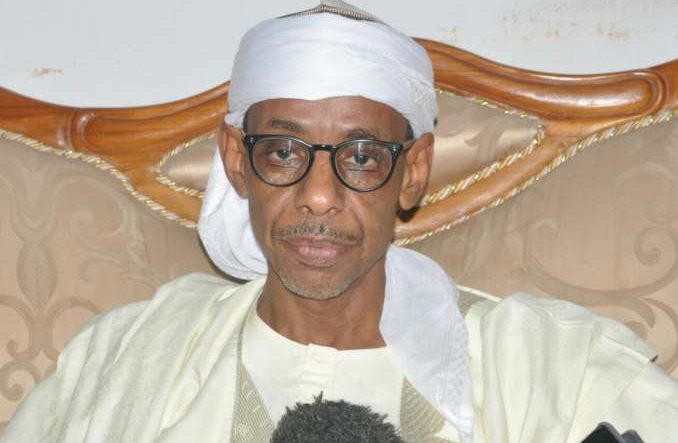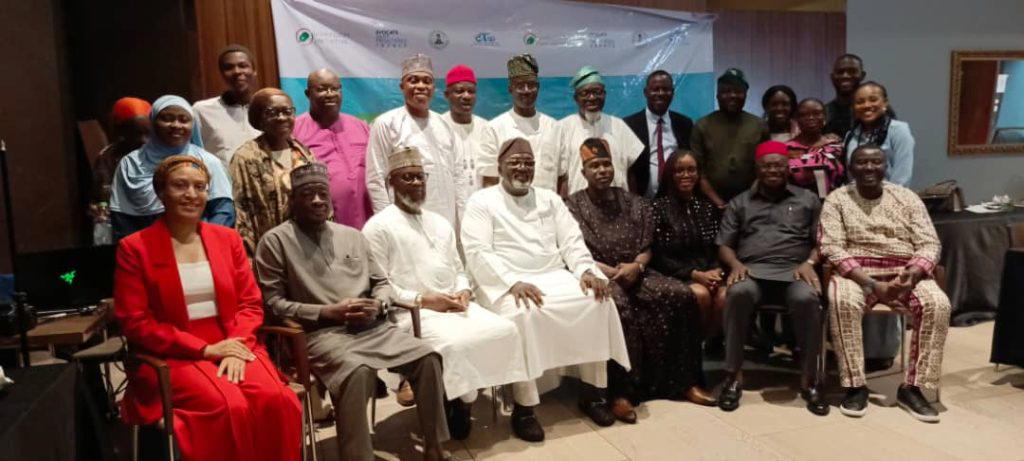
STATE OF THE NATION: It’s embarrassing that we’ve politicised terrorism — Sen Owie, ex-Senate Chief Whip,
•Nigeria must stop ethnicising insecurity
•Warns against selective prosecution in anti-corruption campaign
By Chioma Gabriel, Editor, Special Features
The pioneer Chief whip of the Senate, Senator Roland Stephen Owie, was elected Senator for the Edo South Senatorial District of Edo State at the start of the Nigerian Fourth Republic, running on the Peoples Democratic Party, PDP, platform.
He took office on 29 May 1999 as chief whip after forming a formidable team with then President of the Senate, Chuba Okadigbo. Before he became a senator, he was in the House of Representatives in 1979
After taking his seat in the Senate, he was appointed to committees on Selection, Senate Services, Power and Steel, Agriculture, Water Resources, and Drug and Narcotics.
In this interview, he speaks on the various challenges derailing democracy. Excerpts:
Democracy today doesn’t seem to be what we ordered. What we got is different from what we ordered. There are concerns that the Supreme Court’s recent judgment has given room for various interpretations. We have the judgment on Rivers State, dealing with local government elections, which some lawyers have argued is outside of the jurisdiction of the apex court. We have that on the PDP secretary position, where both camps are claiming history, and recently that of the Labour Party, where different factions say they won. These judgments raised more questions. What is the way out?
It’s always a privilege to contribute to the national discourse, especially on issues that cut to the heart of our democratic journey. This conversation is particularly meaningful as we approach 26 unbroken years of Nigeria’s return to civil democratic governance.
I hold the Supreme Court and, by extension, the judiciary in the highest regard. I therefore refrain from ascribing motives to its decisions.
However, growing domestic and international concerns over what appear to be conflicting judgments, particularly in the Rivers State local government case, the PDP Secretary tussle, and the Labour Party factional dispute, cannot be ignored. These outcomes have raised constitutional ambiguities and cast shadows over the clarity of judicial precedent.
Without prejudice to the specifics of these cases, each of which has morphed into a national talking point, what is urgently needed is deep introspection by our learned Justices. The integrity of the judiciary is the final frontier of democratic legitimacy. To avoid a complete erosion of public confidence, Nigeria must pursue a comprehensive judicial reform rooted in independence, transparency, and insulation from political interference. Anything less is akin to applying plaster on a festering wound.
Surprisingly, critical voices have gone silent over our democratic and economic woes. Why are people suddenly so silent?
While I cannot speak for those once-vocal activists who now maintain silence, one cannot ignore the commercialization of Nigeria’s civil society space. Today, it is marked by a scramble for donor funding, both local and international, while many civil society leaders have cultivated incestuous, often compromised relationships with the very governments they are meant to critique.
The result? A civil society that increasingly resembles a subsidiary of the state, lacking the moral clarity to serve as a true watchdog.
The solution is threefold: The public must hold CSO leaders accountable and reject duplicity.
Regulatory frameworks, akin to 501(c)(3) regulations in the U.S. or the Charity Commission in the UK, must be instituted to monitor operations and ensure integrity, and civil society must reclaim its founding ethos as a voice for the voiceless and a counterbalance to unchecked power.
Looking at the number of persons, some of whom once had EFCC cases occupying strategic government appointments and positions, how would you rate this government’s anti-corruption fight?
The jury is still out on this administration’s anti-corruption credentials. However, the troubling practice of appointing individuals with pending or historical corruption cases to high office is not new—it was normalized under the Buhari administration in 2015 and sadly persists today.
Beyond headline-grabbing cases like the Godwin Emefiele probe, there has been no systematic or strategic campaign against corruption. What we see is selective prosecution and theatrical symbolism, not deep reform. We await real action.
Inflation or GDP rebasing, a major economic policy measure of the regime, has put the macroeconomic indicators in a positive light at least, lowering the inflation figures. What are the key benefits to the economy and the people?
I am not an economist and I will not hide behind technical jargon. For Nigerians, the question is simple: Are we better off than we were two years ago? The answer is a resounding no.
GDP rebasing and manipulated inflation metrics may look good on paper, but they are meaningless if the average citizen cannot afford food, fuel, healthcare, or education. Economic policy must move from numbers to nourishment, from abstractions to lived experience.
World Bank/IMF reports that reforms are not benefiting the larger population. Who is benefiting?
I have not read the specific World Bank or IMF report referenced, but if they indeed admitted that the reforms are not benefiting the broader population, then they owe us an answer: who are the beneficiaries?
The Nigerian masses are not among them. Given that many of these reforms were promoted by the Bretton Woods institutions themselves, they must tell us who precisely they were designed for because what we see is a nation drowning in poverty, not progress.
Give us your assessment of petrol subsidy removal and full deregulation of the sector.
In principle, I support full deregulation of the petroleum sector. But policy must be about people. Removing subsidies without preparing a viable safety net was not only tactically flawed. It was morally irresponsible.
What followed were soaring inflation, hardship, and despair. Strategic sequencing and humane implementation are the cornerstones of meaningful reform. Unfortunately, this was poorly thought through and chaotically executed.
Why is the Tinubu administration not seen to enjoy the support of Nigerians?
This is because hunger has no ideology. When citizens cannot afford food, rent, transportation, or basic healthcare, support becomes elusive. You cannot engage a starving population in policy discourse. Governance must first guarantee subsistence before expecting civic loyalty.
There is a claim that about N19 trillion has been reportedly spent on addressing the worsening insecurity, yet Nigerians are not safe.
It is shocking to hear that nearly N19 trillion has been spent on security, yet Nigerians remain unsafe. The current National Assembly, which appropriated these funds, must lead the charge for accountability and public inquiry. No democracy can survive when public funds are expended without scrutiny or consequences.
What is your honest assessment of the security situation in the country?
Nigeria is in the throes of an existential security crisis. From the Northwest to the Southeast, lives are lost daily to terrorism, banditry, and communal conflict. Governments at all levels must realize that security is not optional. It is foundational.
We need a national security reset, underpinned by intelligence reform, community policing, inter-agency collaboration, and the modernisation of our armed forces.
Terrorists seem to be on the rampage in many parts of the country, and their deadly exploits have rendered many Nigerians helpless…
It is an embarrassing tragedy that we have politicized terrorism and the farmers-herders conflict for so long. Lives have been lost while political correctness has triumphed over decisive action.
We must stop ethnicizing insecurity. The government must act with fairness and firmness in deploying security assets where needed, prosecuting offenders, and supporting affected communities. This is about justice and survival, not politics.
The police, from all indications, seem to be helpless over the growing insecurity in the country. Yet, a large number of them are attached to private and wealthy individuals.
The security crisis extends far beyond police officers being assigned to the rich and powerful. When governors like that of Borno publicly lament that the entire region has been captured by insurgents, we are dealing with a systemic breakdown.
We must re-imagine security not as the exclusive preserve of Abuja, but as a shared national responsibility, with states and communities empowered and resourced to play a central role.
Eyebrows are being raised over the lingering issue of releasing criminals who have been confirmed with overwhelming evidence. Accusing fingers have been pointed at both the police and the judiciary.
This is a dangerous trend and yes, the police and judiciary must take some blame, but this issue is deeper. It is political. It is systemic. We must summon the courage to have honest conversations, rebuild institutional integrity, and deploy the necessary political capital to protect our justice system from collapse.
The post STATE OF THE NATION: It’s embarrassing that we’ve politicised terrorism — Sen Owie, ex-Senate Chief Whip appeared first on Vanguard News.
,
The pioneer Chief whip of the Senate, Senator Roland Stephen Owie, was elected Senator for the Edo South Senatorial District of Edo State at the start of the Nigerian Fourth Republic, running on the Peoples Democratic Party, PDP, platform.
The post STATE OF THE NATION: It’s embarrassing that we’ve politicised terrorism — Sen Owie, ex-Senate Chief Whip appeared first on Vanguard News.
, , Nwafor, {authorlink},, , Vanguard News, May 28, 2025, 1:19 am











